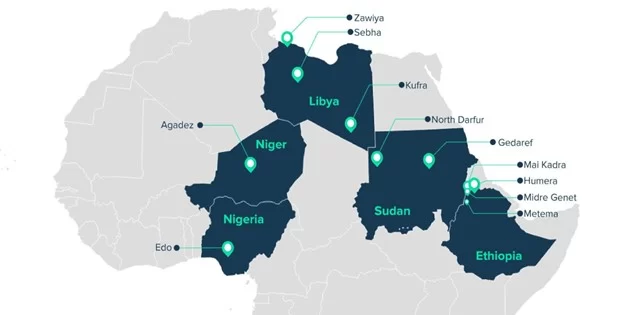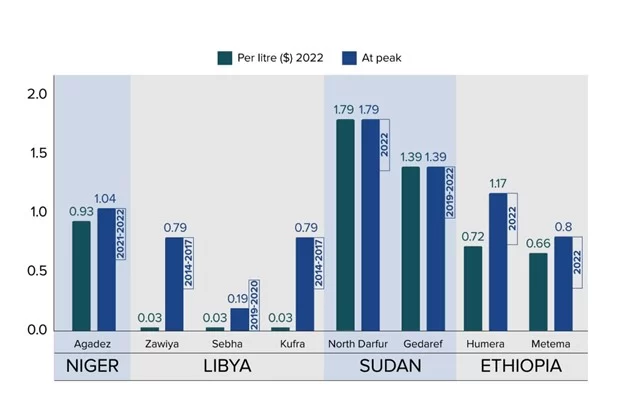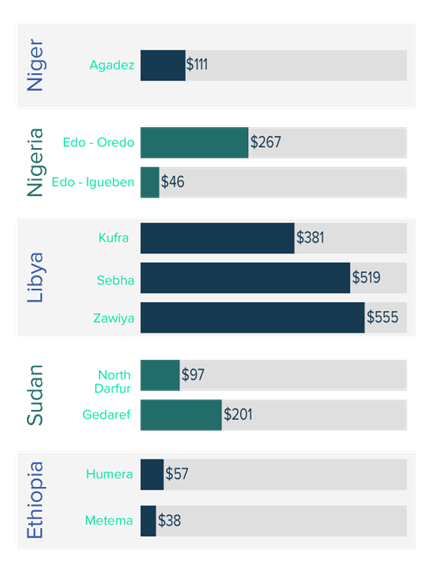In 2022, populations across the world have reeled from a global cost of living crisis. Children in low and middle income countries are going to bed hungry, while for some families, drops in income will wipe out the equivalent of household healthcare budgets. By some estimates, 71 million people could fall into poverty.
African populations have borne some of the greatest hardships of crises taking place both near and far. While attention has rightly been on war between Russia and Ukraine, local and regional conflict has long undermined economic development across almost a third of the African continent. Local and regional conflict compounds (and is sometimes caused by) other supply constraints rooted in climate change and poor infrastructure, particularly in the agricultural sector.
This matters because struggles to eat, go to work, and save for the future threaten political stability and could create further violent conflict, which would accelerate economic decline. In Europe, fuel price hikes have already stoked social unrest. While some governments are spending big to protect citizens through tax reductions, wage increases, and price subsidies, others will have few tools at their disposal. Instead, their populations will be forced to adapt, changing patterns of work, consumption, and trade.
Research for XCEPT by Emani sought to understand this at a local level. In March and April 2022, in the immediate aftermath of Russia’s invasion of Ukraine, we spoke to over 3,000 people across 11 locations in Ethiopia, Libya, Niger, Nigeria, and Sudan (Figure 1) – all of which import wheat from Russia or Ukraine.
The research zoomed in on the local effects of this conflict and the unique ways in which these effects interact with local dynamics. It compared the current situation with local challenges over the last decade, wider patterns of economic marginalisation, and the agency of residents – how are they coping with these challenges? What are the local effects of government policies? And what are the wider implications for stability in the region?
Here are five of our key takeaways.

1. Food and fuel prices have climbed fast
We asked survey respondents to tell us how much they were paying for staple foods ‘now’ (April 2022). Then we asked them to compare current prices with their experiences of spikes in price since 2010. Consumers were suffering particularly where imported products were popular. For example, Algerian milk was being sold in Agadez for nearly five times more in 2022 than 2010. A 25kg bag of rice cost 62% more in Agadez compared with 2011, and a ‘rubber’ (4kg bag) of rice in Oredo (Nigeria) cost 69% more. Some of the increases, however, were recent and sudden. In Sebha and Zawiya (Libya), flour was up 22% and 33% respectively in April compared to the beginning of 2022.
In some places, we asked about motor fuel too. Fuel prices in locations in Ethiopia, Sudan, and Niger were at their 12-year peak at the time of data collection (Figure 2).
2. Conflict, COVID-19, and currency values drove price fluctuations
Conflict is one of the main drivers of fuel prices in Libya. Libyans usually enjoy relatively cheap, subsidised fuel at around $0.03 per litre. As a result, when subsidised fuel becomes scarce, the rates set by the market are much higher than elsewhere. For example, for the three years after the outbreak of the Libyan civil war in 2014, the average fuel prices in Zawiya and Kufra skyrocketed to $0.79, 26 times the typical price.

In the areas we studied, the real, on-the-ground issue that shaped trade – and, by extension, prices – was the ability to move goods. Insecurity in Libya made driving goods down from the northern ports to Sebha (and onwards to Agadez) more expensive, with drivers asking higher fees and militia groups demanding unofficial taxes.
The availability of space for goods in southward-moving vehicles may also have been affected by policies designed to disrupt organised crime. A clamp-down on the smuggling of migrants from Agadez (Niger) through Sebha (Libya) reduced the number of vehicles travelling north with passengers and, correspondingly, the number of vehicles returning south with space to carry goods. Interviewees told us that this made it more expensive to move goods from Libya to Niger.
The unpredictable security environment had similar effects in Ethiopia and Sudan. The outbreak of the conflict in Tigray, northern Ethiopia, in late 2020 led to closures along the border. Towns on either side of the border, such as Gallabat in Sudan and Metema in Ethiopia, were cut off from one another. These towns had previously benefitted from joint trading agreements allowing for free cross-border movement during market days. The impact has been an increase in cross-border smuggling and in the cost of basic goods. For example, residents of Mai Kadra, on the Ethiopian side of the border, noted the price of vegetables and cereals rising as a result of supply shortages caused by blockades at Sudanese border crossings.
Onions per kilo [have gone] from 5 birr to 40 birr, tomatoes per kilo [have gone] from 4 birr to 40 birr… The main reason for this is the war and the resulting blockade of trade through the border crossings at Lugdi, Hamdayit and Medebay [district] … and the general national level shortage of supplies.
Interviewee in Mai Kadra
[Since] the blockage of the border some of the [businesses] are not performing well and some of the labourers are [laid-off] … There is very [little] merchandise imported from the border.
Survey respondent, Metema
In addition to conflict, a second key factor driving price fluctuations was the cost of foreign currency and reliance on – or desire for – imported goods, including basic food items such as pasta, flour and rice. For example, the COVID-induced closure of the Niger-Algeria border strongly impacted the price of pasta – widely consumed in Agadez and almost exclusively imported from Algeria.
With the exception of the pegged and stable West African Franc, people told us that wild variations in the value of the Naira, Libyan Dinar, Sudanese Pound, and Ethiopian Birr severely hampered their ability to pay for foreign goods. Other reasons were poor infrastructure, mismanagement of public resources and funds (Kufra), interruption in fuel subsidies (Sudan), and a ban on imported goods (Nigeria).
The closure of the Algerian border had a significant impact, especially on the price of wheat flour.
Representative of local government business centre, Agadez
3. Self-reliance offers some protection against price spikes
Monthly incomes vary considerably across the locations we studied (Figure 3). Yet the pain consumers are feeling does not necessarily correspond to their purchasing power. In rural Edo State (Nigeria), where the average income is only $46 per month, respondents were much less likely to notice spikes in food prices than in other areas we studied. Almost all Nigerians purchase at least some of their food, but those who rely on subsistence farming seem to be somewhat protected from market volatility.
Economic hardship may be driving deeper change in social and economic relations at the micro level. We found that residents of Oredo in Benin City (Edo State, Nigeria) were increasingly spending weekends in their ancestral villages to grow the vegetables they could no longer afford to buy on the market. This is despite the average income in peri-urban Oredo being nearly six times that of rural Igueben, a couple of hours drive away.
The only way I cope is visiting my home town to cultivate some of our own food and survive through that means.
Male, 25, in Oredo, Nigeria
Conversely, dependence on more expensive imported foods left some vulnerable to increases in price. For many, consumption of imported rice is a show of status – such that even local rice is sometimes packaged as having come from abroad in order to attract a premium. Nigeria’s ban on the import of most rice from abroad plus the more recent devastation of rice paddies in floods will drive prices up. Many households will feel noticeably poorer and have to change what they consume. At worst, they may struggle to put food on the table.

4. People are coping, some better than others
The situation appears most desperate in Kufra (Libya), where many respondents had stopped cooking hot meals to save on cooking gas – and some had reduced the number of meals they eat to save money on food, while taking on debt to make ends meet. Respondents in Sebha (Libya) were eating less meat and baking more at home. Across our Libya research sites, respondents reported switching to low-cost food brands. Facebook groups were important in helping residents to find good deals.
In Gedaref (Sudan), farmers were switching from sorghum, millet and wheat to more profitable cotton and maize production. This will decrease domestic food production and potentially exacerbate food insecurity in the region. People in Ethiopia, Niger and Nigeria described substituting cooking gas for wood, even though many were aware of the damage this could do to the environment – from deforestation in Edo State (Nigeria) and in Tigray (Ethiopia) to desertification in Agadez (Niger).
We are dependent on the electricity supply when there is no gas [and when it’s not available] we can sometimes cook just once per week.
Interviewee in Sebha, Libya
Sometimes we have to use wood to prepare food, and I walk long distances because of the lack of time to get gas for the car.
Interviewee in Kufra, Libya
5. Crime thrives in the absence of the state
In most locations, the state regulated and often subsidised the sale of both staple foods and fuel. In Kufra (Libya), with the lowest average income of the three areas studied in Libya, most respondents were receiving subsidies for food (82%) and medicine (76%). Government support was otherwise quite limited in scale and reach. Participants in Edo (Nigeria) mostly said support was negligible. The same was true for Gedaref and North Darfur (Sudan). Respondents in Mai Kadra (Ethiopia) said that government support had collapsed following the outbreak of conflict in 2020.
When the state cannot provide, people turn to other means and methods, which can further undermine the government’s ability to maintain the rule of law. Research participants in Metema (Ethiopia) told us about the importance of smuggling to bolster incomes. In Libya, subsidised goods were being appropriated by criminal groups and sold at high prices. In Sudan, the gap in officially sanctioned financial services is filled by unofficial money lenders and remitters.
Most local people have livelihoods strongly linked with contraband and smuggling … the smuggling is the source of non-food items such as soap, cloths, and related [goods].
Focus group participant, Metema, Ethiopia
Cooking gas is officially 5 dinars and is sold in the black market for 35-90 Dinar ($7.42 – $19.09).
Interviewee in Sebha, Libya
Peace through economic wellbeing
Even if the geopolitical and public health issues that have throttled food and fuel supply chains are resolved soon, people will continue to struggle. Among other repercussions, the scarcity of affordable goods on formal markets will drive the growth in informal trade, which will undermine state revenues and so the capacity of governments to provide services, in turn leading to a lack of public faith in the government. Declining tax revenues, popular discontent, and illicit financial flows are a potent mix in the Sahel, Horn of Africa, and Libya, where state authority is often already in question.
It’s not the first time that the countries we were researching – and others in Africa – have faced being locked into a vicious cycle of conflict and constrained economic growth. Economic growth rates are as much as 2.5 percentage points lower in countries affected by conflict, and the longer the conflict lasts the more those countries fall behind. And just as conflict constrains growth, prosperity can boost peace.
Yet as others have pointed out before, responses to conflict on the continent tend to focus on security, with the licit economy often collateral to measures aiming to disrupt illegal trade and armed groups. Instead, prioritising the licit flow of goods in critical cross-border towns and provinces can improve wellbeing, a sense of local stability, and weaken incentives towards potentially destabilising activities, from appropriation and smuggling of subsidised goods, to the more nefarious trade in drugs and arms.
